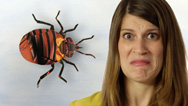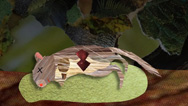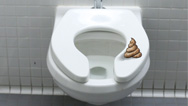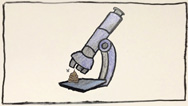How Vultures Can Eat Rotten Meat
- By Anna Rothschild
- Posted 11.05.15
- NOVA
If we ate really rotten meat, we'd get pretty sick. But vultures eat rotten meat all the time and don't get food poisoning. Find out how they do it in this episode of Gross Science.
Transcript
How Vultures Can Eat Rotten Meat
Posted: November 5, 2015
When your primary food source is festering meat, acid, poop, and bacteria become some of your best friends.
I’m Anna Rothschild, and this is Gross Science.
Vultures are meat-eating scavengers. That means that they don’t kill their own prey—instead they wait for another animal to make a kill, and then chow down on the leftovers.
The thing is, rotten meat can have harmful bacteria on it, like pathogens that cause food poisoning, or even anthrax. If you or I ate those microbes, we’d be in big trouble. But vultures don’t seem to care. They’ll actually go a disgusting step further. To get at the fleshy goodness inside a rotting carcass, they’ll peck in at the animal’s softest spots, like the anus, inadvertently scooping up feces along with the bacteria-ridden meat.
So, how do vultures cope? Well, they have incredibly acidic stomachs, which help them to digest bone and kill diseases like anthrax. They’ve also evolved either immunity or at least a level of tolerance for certain types of bacterial toxins. In fact, their intestines are naturally colonized by species of bacteria that are related to disease-causing ones typically found on rotting meat.
On top of that, some vultures poop on their legs. This is a behavior called urohydrosis, and typically birds do it to cool down since they don’t sweat. But scientists think the poop may also have antimicrobial properties, and could help clean their legs. Cleanliness is also one hypothesis for why vultures are bald. Feathers on their neck and head would only make it easier for bacteria to stick to them.
But vultures aren’t immune to everything. While they might not fall victim to the same diseases we do, certain medications given to livestock are actually poisonous to vultures, putting these guys at risk.
And, because of their unique ability to clean up disease-ridden carcasses, and keep other scavengers in check, vultures would be a terrible thing to lose.
Ew.
Credits
PRODUCTION CREDITS
- Host, Animator, Editor
- Anna Rothschild
- Writers
- Elizabeth Gillis and Anna Rothschild
- DP, Sound
- Elizabeth Gillis
- Bye Bye Buddy
- Music Provided by APM
IMAGES AND VIDEO
- Original Footage
- ©WGBH Educational Foundation 2015
- Vultures Eating Zebra
- Courtesy Dan Fagin
- Gyps fulvus 02
- Wikimedia Commons/H. Zell
SFX
- Cockroaches
-
Freesound/StateAardvark
(used with permission from author) - Squeak Pack/squeak_10
- Freesound/Corsica_S
- Jelly Mangling on a Plate
- Freesound/lolamadeus
- Projector Screen Pull In Out
- Freesound/yoh
- Wink
- Freesound/bennychico11
- Produced by WGBH for PBS Digital Studios
POSTER IMAGE
- Gyps fulvus 02
- Wikimedia Commons/H. Zell
Sources
Want more info?
Vulture microbiome paper:
http://www.nature.com/ncomms/2014/141125/ncomms6498/full/ncomms6498.html
Hawk Mountain Sanctuary Association:
http://www.hawkmountain.org/
Related Links
-

Gross Science
Bizarre stories from the slimy, smelly, creepy world of science.
-

Can Microbes Solve Crimes?
Meet your necrobiome—the microbes that thrive on your body after you die.
-

How Dirty Are Public Restrooms?
What is lurking in the bathroom?
-

The Power of Poop
Poop is a great source of fertilizer, heat, and electricity.

